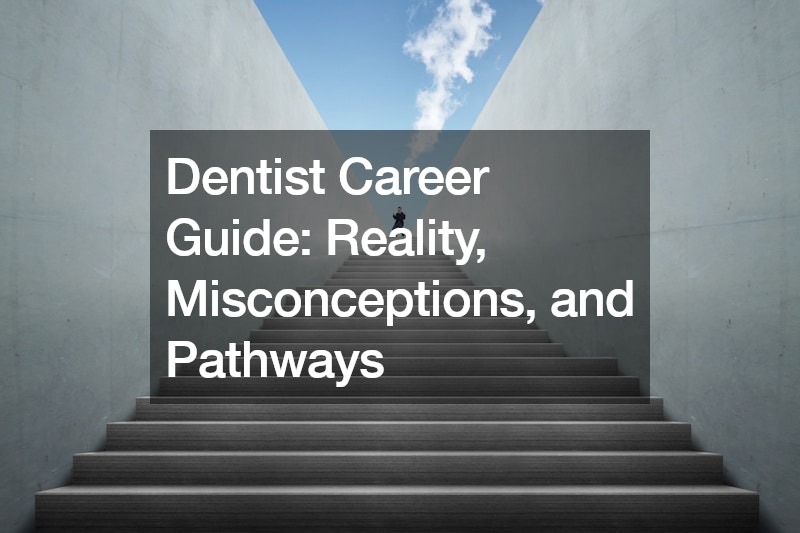Ever since childhood, the dentist‘s office might have evoked curiosity and nervous anticipation. But have you ever considered dentistry as a career path? Dentistry offers a rewarding and fulfilling profession for those with a passion for oral health and a desire to help others. This guide delves into the reality of a dentist’s career, addressing common misconceptions and outlining the pathways to becoming a successful dentist in the United States.
The Reality of a Dentist’s Career: Beyond the Stereotypes
The image of a dentist often conjures up visions of gleaming white coats and drilling teeth. While these elements are part of the job, the reality of a dentist’s career encompasses a broader spectrum:
Patient Care: The core of dentistry lies in patient care. This involves diagnosing and treating oral health conditions, performing preventive procedures like cleanings and fluoride treatments, and restoring damaged teeth with fillings, crowns, or implants. Communication and Collaboration: Building rapport with patients, understanding their needs, and explaining procedures effectively are crucial aspects of the job. Dentists often collaborate with dental hygienists, assistants, and other specialists to ensure optimal patient care. Continuing Education: Dentistry is a constantly evolving field. Maintaining up-to-date knowledge through continuing education courses is essential to provide patients with the latest advancements in dental techniques and technologies. Business Acumen: Business management skills become crucial for dentists running their practices. This involves managing staff, overseeing financial aspects, and marketing their practice to attract new patients. Misconceptions Debunked: Dispelling Myths about Dentistry
Several misconceptions surround the dentist’s profession. Let’s address some of the most common ones:
Myth: Dentistry is purely about teeth. Reality: While oral health is central, dentists play a role in overall well-being. Oral health is linked to systemic health; dentists can identify signs of underlying medical conditions through oral examinations. Myth: Dentists have a purely clinical role. Reality: Connecting with patients and alleviating their anxieties is crucial. Excellent communication skills and a patient-centered approach are highly valued in dentistry. Myth: Dentists have a predictable schedule. Reality: While some dentists work traditional office hours, others may have flexible schedules depending on their practice setting. Some dentists specialize in areas requiring on-call availability, like oral surgery. Myth: Dentistry is a high-stress career. Reality: While managing a practice or working long hours can be stressful, advancements in technology and better time management techniques are improving the work-life balance for dentists. Pathways to Becoming a Dentist
The journey to becoming a dentist requires dedication and commitment:
Bachelor’s Degree: Earning a bachelor’s degree in pre-dentistry or a science-related field is the first step. Coursework typically includes biology, chemistry, physics, and mathematics. Dental Admissions Test (DAT): Passing the DAT is a mandatory requirement for admission to dental schools. Doctor of Dental Surgery (DDS) or Doctor of Medicine in Dentistry (DMD): Dental school typically takes four years and culminates with a DDS or DMD degree. The curriculum encompasses classroom learning, laboratory work, and clinical practice. Licensure Exams: After graduation, passing National Board Dental Examinations (NBDE) and state-specific licensure exams is necessary to practice dentistry. Residency (Optional): While not mandatory for general dentistry, some dentists pursue residency programs in specialties like orthodontics, oral surgery, or pediatric dentistry. Beyond the DDS/DMD: Career Options for Dentists
The career path for a dentist extends beyond traditional private practice:
Public Health Dentistry: Focuses on improving oral health within communities, working in public health departments or school-based programs. Academic Dentistry: Teaching future dentists at dental schools and contributing to research advancements. Corporate Dentistry: Working in large dental groups or chains, offering a salaried position with benefits and potentially less administrative burden. Research and Development: Contributing to developing new dental technologies and materials within research institutions or dental product companies. Conclusion: A Rewarding Path for the Passionate
Dentistry offers a fulfilling career path for those driven to improve oral health and well-being. If you possess the dedication, academic aptitude, and desire to impact people’s lives positively, consider exploring dentistry. With hard work and perseverance, you can make the dream of becoming a dentist a reality. Remember, the journey requires commitment, but the rewards of a successful dental career are immense, offering personal satisfaction, professional growth, and the opportunity to make a lasting difference in the lives of your patients. Additional Considerations: Financial Investment and Work-Life Balance
Pursuing a career in dentistry requires a significant financial investment. Dental school tuition fees can be substantial. However, various scholarships, loan programs, and income-based repayment options are available to help manage the cost.
Work-life balance can concern dentists, especially those managing private practices. However, technological advancements and practice management strategies have led to more flexible schedules. Many dentists are successfully achieving a healthy balance between their professional and personal lives.
Dentistry: A Career Worth Exploring
A career in dentistry offers a unique blend of science, artistry, and patient care. It provides an opportunity to make a tangible difference in people’s lives by promoting oral health and overall well-being. Dentistry might be the perfect career path for you if you’re passionate about science, have a gentle touch, and enjoy interacting with people. With dedication, the right resources, and a commitment to lifelong learning, you can pave the way for a successful and rewarding journey as a dentist.
.


